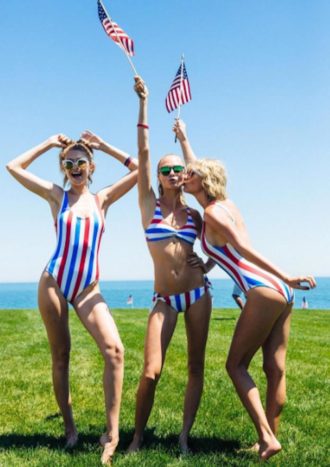Ahmet Zappa On ‘Eat That Question’ & His Father, Musician Frank Zappa [VIDEO EXCLUSIVE]
Ahmet Zappa, musician Frank Zappa’s youngest son, recently made the documentary Eat That Question about his late father with his mother Gail Zappa.
Ahmet Zappa On Frank Zappa
Eat That Question started as a project that Gail took on with director Thorston Schutte, who wanted to make an unconventional documentary about Frank Zappa. Instead of making a straight biographical doc, they set about creating a documentary that would explore Frank Zappa’s relationship with the media. Eventually, when Gail became sick, Ahmet Zappa stepped in to see the project through.
For Ahmet, it was a given that he would help the documentary about his father reach completion. Ahmet, 40, is still in awe of his father. “Frank was one of a kind. He was so awesome,” Ahmet told uInterview in an exclusive interview. Ahmet recounted how his father’s openness with him and his siblings led to them making good decisions.
“I think there was some kind of magic in the parenting skills of Frank and Gail to where they always kept us so engaged,” Ahmet explained. “We always had a seat at the table, in terms of conversation with whoever was coming by the house. We were really blessed to have them as parents.”
Part of the Zappas’ unique and effective parenting was allowing their young children to use swear words at their own discretion.
“As he would explain it to us — there’s no word in the English language that can make you go to hell,” Ahmet told uInterview. “If it helps you get the point across of what you’re trying to express why is that wrong? I actually agreed with him. I think certainly there’s a time and place depending on other people’s preferences. I’m not gonna start swearing at you right now for no good reason, you would be potentially offended but I think that’s kinda what they instilled in us — which was an understanding of where and when to use the words, the bad words.”
If Frank Zappa was still alive now, Ahmet believes that he would be speaking up about the censorship in the music industry – as well as the current political climate.
“He would be furious and he would do whatever it takes to try to stop [censorship],” said Ahmet. Of his father’s reaction to today’s politics, Ahmet added, “He would really try to get people to have some critical thinking here and certainly stick to your guns, fight for what you believe in and I think he would encourage people to get involved to make the changes that are necessary.”
Well, that was a journey that actually started with my mother. About eight years ago, he contacted my Mom and they began this journey and I think his point of view of focusing on Frank’s relationship to media versus a straightforward doc — a music doc or a bio doc. I think at that time sitting with my Mom that was really intriguing, and this is eight years in the making. It’s a journey that started with Thorsten, the director, and my Mom, and I got involved really towards the end of the eight year journey when my mother was really sick, and she was really proud of this movie. I’m really proud of the movie, and helped get it passed the finish line, but really Thorsten and my mother, they developed this great friendship over this long period of time. So, the movie that people are seeing right now I couldn’t be more proud and I love that people are enjoying it.
I know how I feel about it. Hearing my father talk about — as he would explain it to us — there’s no word in the English language that can make you go to Hell. When he’s talking to you like that you question when you’re a kid like, ‘What does that mean?’ Then, there’s something kind of exciting about these words that you’re not supposed to say and in our household it was like, ‘Yeah say whatever you want.’ If it helps you get the point across of what you’re trying to express why is that wrong? I actually agreed with him. I think certainly there’s a time and place depending on other people’s preferences. I’m not gonna start swearing at you right now for no good reason, you would be potentially offended but I think that’s kinda what they instilled in us — which was an understanding of where and when to use the words, the bad words.
If we all wanted to go out and do a bunch of drugs my parents were like, ‘That’s a bad idea,’ and they would have conversations with us and so none of us wound up doing drugs. They led by example, so I think it’s interesting because I grew up with a lot of friends that were experimental and it just had no allure for us. So, I think there was some kind of magic in the parenting skills of Frank and Gail to where they always kept us so engaged. We always had a seat at the table, in terms of conversation with whoever was coming by the house. We were really blessed to have them as parents. Frank was one of a kind, he was so awesome.
He would never have stopped fighting for artists’ rights. He would do anything to rally against censorship, there’s still a lot of it going on. He would be furious and he would do whatever it takes to try to stop it. My Dad was a man of integrity and I think if you see the movie you’ll get this snapshot of what a fierce protector of our rights...he would encourage everyone to go out and vote, which I encourage everyone to do as well. It’s a weird time right now, there’s lots of weird things happening in the world — scary things.
A part of him would laugh, I think, at some of the absurdities as he would see them. But, I actually don’t think it’s all that funny. He would really try to get people to have some critical thinking here and certainly stick to your guns, fight for what you believe in and I think he would encourage people to get involved to make the changes that are necessary. I can’t really speak to that. I just know that if you look historically at my father he always stood for what he believed in and I think his points of view were always justified.
RELATED ARTICLES
Get the most-revealing celebrity conversations with the uInterview podcast!



![Ahmet Zappa On ‘Eat That Question’ & His Father, Musician Frank Zappa [VIDEO EXCLUSIVE]](https://cdn-o9.uinterview.com/wp-content/uploads/2016/07/news-Ahmet-Zappa.jpeg)
 Click here for the Best Celebrity Bikinis Of Summer 2016 Photos Slideshow
Click here for the Best Celebrity Bikinis Of Summer 2016 Photos Slideshow




Leave a comment